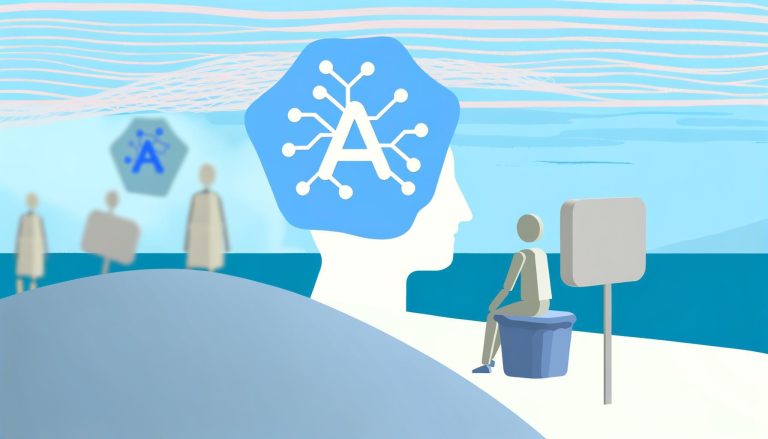In recent years, the intersection of artificial intelligence (AI) and healthcare has opened up a world of possibilities, particularly in diagnosing and treating sleep disorders. From insomnia to sleep apnea, millions of people worldwide struggle with sleep-related issues that affect their well-being and quality of life. This article explores innovative AI approaches to managing sleep disorders, offering valuable insights to help you enjoy more restful nights.
Understanding Sleep Disorders: A Brief Overview
Sleep disorders encompass a range of conditions that disrupt normal sleep patterns. Common sleep disorders include:
- Insomnia: Difficulty falling or staying asleep.
- Sleep Apnea: Intermittent pauses in breathing during sleep.
- Restless Legs Syndrome (RLS): Uncomfortable sensations in the legs causing an urge to move.
- Narcolepsy: Overwhelming daytime drowsiness and sudden sleep attacks.
- Parasomnias: Unusual behaviors during sleep, such as sleepwalking or night terrors.
Sleep is crucial for physical and mental health, making the identification and treatment of sleep disorders essential for overall well-being. Enter AI: a powerful tool offering new hope for those experiencing sleep disruption.
AI-Powered Innovations in Sleep Disorder Management
1. Sleep Monitoring and Diagnostics
AI technologies have revolutionized how sleep disorders are diagnosed and monitored. Traditional sleep studies are often cumbersome and require overnight stays in sleep labs. AI-driven solutions, however, are bringing diagnostics into the comfort of your home.
Wearable devices, such as smartwatches and fitness bands, track sleep patterns using sensors that measure movement, heart rate, and oxygen levels. These devices leverage AI algorithms to interpret the data, providing insights into your sleep quality and pinpointing potential issues.
Additionally, AI-powered apps, such as Somryst and Sleepio, offer Cognitive Behavioral Therapy for Insomnia (CBT-I), guiding users through personalized sleep improvement plans based on their monitored sleep data.
2. Personalized Treatment Plans
One of the most significant advantages of AI in sleep disorder management is the ability to create highly personalized treatment plans. By analyzing vast amounts of data, AI can identify patterns and recommend interventions tailored to individual needs.
For example, AI algorithms can suggest optimal bedtimes, wake times, and sleep environments based on your unique sleep profile. They can also alert healthcare providers to intervene with specific treatments, such as CPAP machines for sleep apnea patients, ensuring that the solutions are perfectly suited to your condition.
3. Sleep Coaching and Behavioral Interventions
AI-driven applications such as virtual sleep coaches are becoming increasingly popular. These tools offer personalized guidance on sleep hygiene, relaxation techniques, and behavioral strategies to improve sleep quality.
- Relaxation Techniques: Guided meditation and breathing exercises to help calm the mind before bed.
- Sleep Hygiene Tips: Advice on creating a conducive sleep environment, such as maintaining a consistent sleep schedule and reducing screen time before bed.
- Behavioral Strategies: Techniques to manage anxiety and stress, which are often underlying causes of insomnia.
Programs like Wysa and CBT-i Coach provide 24/7 support, making it easier for individuals to incorporate sleep-friendly habits into their daily routines.
The Benefits of AI-Driven Approaches to Sleep Disorders
Integrating AI into sleep disorder management offers numerous benefits that can significantly improve overall health and well-being:
- Accuracy: AI algorithms analyze complex data with precision, leading to more accurate diagnoses and treatment recommendations.
- Convenience: Home-based monitoring solutions eliminate the need for inconvenient overnight sleep lab studies.
- Personalization: Customized treatment plans address the unique needs of each individual, promoting better outcomes.
- Early Intervention: AI can detect early signs of sleep disorders, allowing for timely intervention and prevention of complications.
- Accessibility: AI-powered apps and wearables make sleep disorder management more accessible, particularly for those in remote areas or with limited healthcare access.
Practical Tips for Improving Sleep with AI
Incorporating AI into your sleep routine is easier than you might think. Here are some practical tips to get started:
- Invest in a Wearable Device: Consider purchasing a smartwatch or fitness band with sleep tracking capabilities. These devices are user-friendly and offer valuable insights into your sleep patterns.
- Use Sleep-Tracking Apps: Explore apps like Sleep Cycle, Pillow, or SleepScore, which offer AI-driven analysis and recommendations based on your sleep data.
- Engage with Virtual Sleep Coaches: Try apps that offer guided sleep coaching, meditation, and CBT-I strategies. Popular options include Calm, Headspace, and BetterSleep.
- Adopt a Consistent Sleep Schedule: AI can help you identify the optimal times for sleeping and waking. Stick to a regular schedule to regulate your body’s internal clock.
- Create a Restful Sleep Environment: Utilize AI recommendations to optimize your sleep environment. This may include adjusting room temperature, light levels, and minimizing noise.
- Monitor and Adjust: Regularly review your sleep data and make necessary adjustments to your habits and environment based on AI recommendations.
Challenges and Considerations
While AI offers promising solutions for sleep disorders, there are some challenges and considerations to keep in mind:
- Privacy Concerns: The collection and analysis of personal sleep data raise privacy and security concerns. Ensure you use reputable devices and apps with robust data protection policies.
- Accuracy of Data: While wearables and apps provide useful insights, they may not always be as accurate as clinical-grade diagnostic tools. Consult with a healthcare provider for a comprehensive assessment.
- Cost: High-quality AI-driven wearables and apps can be expensive. Weigh the benefits against the costs to determine the best solution for your needs.
Future Directions in AI and Sleep Disorders
The future of AI in sleep disorder management looks bright, with ongoing research and advancements paving the way for even more sophisticated solutions. Areas of future development include:
- Integration with Other Health Data: Combining sleep data with other health metrics, such as diet, exercise, and mental health, to provide a holistic approach to well-being.
- Enhanced Machine Learning Algorithms: Improving the accuracy and personalization of AI recommendations through advanced machine learning techniques.
- Collaborative Care Models: Fostering collaboration between AI tools and healthcare providers to create comprehensive care plans for patients.
Conclusion
AI is transforming the landscape of sleep disorder management, offering innovative approaches that improve diagnosis, treatment, and overall sleep quality. From wearable devices and personalized treatment plans to virtual sleep coaches and behavioral interventions, AI provides a wealth of resources to help you achieve restful nights.
As AI technology continues to evolve, its potential to enhance our understanding and management of sleep disorders will only grow, bringing us closer to a future where everyone can enjoy the benefits of a good night’s sleep.
For those looking to incorporate AI-driven sleep solutions into their daily routine, the Zenora app offers features like mood tracking, habit monitoring, and goal setting, which can complement AI tools to help you achieve better sleep and overall well-being.





